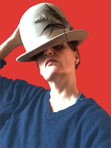Lulu Allison's Blog, page 4
February 14, 2020
#OnceUponAPage
Three days ago I had the idea to write a story in a nearly empty sketch book, (left over from an idea that drifted away.) I thought I would draw and write a story a page a day, with no particular aim. Let the story define itself by finding what ends up on the page. So far, I look forward to it each morning. I’m posting these pages on Twitter, and just now, caught up on Instagram. You can find them by following me on Twitter (@LuluAllison77) or Instaram (Also @LuluAllison77) or by using the hashtag #onceuponapage #onceuponapageuk.
Here are days 1 – 3.
[image error]
[image error]
[image error]
February 6, 2020
Portraits by Pierre Halé
I am very lucky to be able to offer you a portrait by Pierre at the bargain price of £350 – an offer in support of Salt Lick that is two hundred pounds cheaper than Pierre’s regular commission price. Here is a little bit more about Pierre and his work.
[image error]
Pierre and I were friends long ago at St Martins (we re-met and married years later!) and he was, still is, a brilliant painter. Back then and until fairly recently, his work was big, rangy, abstract, with a ghost of the pictorial. There was always a sense of an actual space. First abstract, mathematical, then a more touchable, mysteriously natural space that could refer to the body, to undergrowth, to any number of things. Pierre says that for him both illustration and total abstraction are completely valueless and that painting is in part an attempt to find the right place between the two. The examples below are from the last seven or so years.
[image error]
[image error]
[image error]
For the last couple of years, Pierre has been working on portraits, discovering a joy in this more academic form of painting, discovering all the skills and knowledge that was of no use or interest to a twenty year old abstract painter. The trigger for this was a wet holiday in Wales with my brother and his family. My nephew Jem suggested that as it was too wet for Pierre to continue painting the mountain landscape, he could do a portrait of Jem instead.
[image error]
As soon as we got back, Pierre began learning and experimenting with everything he could about this form of painting, making lots of self portraits. We joked that if people asked, he would tell them he was a self portraitist. (He has also threatened to leave all the many self portraits to my step dad Dave, in his will, telling him he’ll have to get rid of his guitars to make room for them all, but that’s another story.)
[image error]
[image error]
Since then Pierre has taken on commissions, working from photographs. The paintings are in oils on board. His most recent commission is below, with a quote from Jane, the customer who commissioned it.
[image error]
“It was Pierre’s self-portraits on Facebook which so impressed us and gave us the idea of commissioning a portrait of Mike for his 70th birthday. The painting was delivered and displayed at his birthday party where friends from all parts of his life, including his school days, agreed that not only was it a fine painting and a really good likeness but that it captured both the serious and the fun side of his character – no mean achievement.” – Jane
If you (or anyone you know – please feel free to share or send this on to someone!) would like at some point to have a portrait, either of yourself or someone else, this is a really good chance to get one, for £350 – a brilliant price, two hundred pounds cheaper than they would normally be. Please feel free to contact me if you would like to know more, or if you want to discuss what you would like with Pierre.
And of course, with that you get a copy of my book, you help to make it a published reality and you get your name listed amongst the patrons, in every copy, to say thank you for your support.
February 3, 2020
Could Salt Lick change your life?
(This, for just three weeks, is only a little bit of an exaggeration)
Giveaway for all who pledge for Salt Lick!
[image error]
One of the great things about crowdfunding is that you find such generosity in the people around you. My sister Thea is a life coach. She spends her working day connecting with people, listening to them, then helping them formulate changes in their life or business that will get them closer to what it is they really want to achieve. In order to support the funding of Salt Lick, she has offered a coaching session worth £200 to one person who pledges for the book.
[image error]
Anyone who wants to be in this draw simply has to pledge for any of the levels. Each £10 of pledge equates to another entry into the draw, so the e-book preorder at £10 is one entry, the paperback and wish-cow, at £40 gets you four entires. The draw will take place in three weeks, on Monday 24th February. The more you pledge, the more entries you have. And of course you get the book, the reward you pledge for and your name in the back of all copies to say thank you – on top of the chance to win a life-changing coaching session. Past or new pledges all count but let me know you would like to be included.
Thea works with what she terms intuition. The idea is that by guiding your thinking though specific processes, it is possible to achieve discovery and understanding of what is most profoundly important in your plans, and then to find the way of achieving them. I have benefited from her help several times – and it really does help. Somehow a path is revealed that is both exciting and authentic. The authenticity is important. It is what makes it possible to pursue what may turn out to be an unexpected outcome. So I would highly recommend this session for anyone. Whether it be regarding questions about the next step in work, or a business plan, or more general searching for fulfilment.
And don’t forget too that you will be supporting my book to get published. You will have a copy with your name in the back as acknowledgement of your role in making it happen.
———-
More about Thea
45-minute personal coaching session
Thea Allison’s coaching focuses on helping clients find a life of deep personal satisfaction. She works to enhance inner leadership, allowing people to self direct their lives and wisely navigate times of change and transition.
She accesses intuition, and the authentic intelligence of the body to uncover what is true for each individual.
She will guide you to access to your intuition and enable you identify and engage with personal activities, skills, professional direction and passions that will bring deeper fulfilment and meaning to your life.
Thea is offering a free 45-minute session to the winner of the draw. The session can be used to gain new insights into a current issue or goal, or as a broader overview exploring current blocks and areas of potential. The choice of an intuitive or embodiment approach will be yours to make.
February 1, 2020
Junk Messages
I’ve added a new page to my website; a collection of what is sometimes called erasure poetry. I think erasure messages is perhaps more accurate. I used to cut up junk mail, to reveal a new message hidden within the sales pitch. I would love to do more of them but have been so good at ticking ‘no’ boxes that I barely receive any junk mail any more.
The thing I liked best about it was that the signature is still there, presenting the idea of a person, perhaps real or perhaps invented by a marketing department, accidentally signing off on a new message. I reasoned that because they had given me their signature without me asking for it, any liberties I took with it were my right.
At around the same time and along similar lines, I had an idea of printing public Facebook posts and putting them on the small cards you sometimes get tucked into a sheet of clear plastic pockets in newsagents windows. Again, the interest was in whether I was taking liberties or whether there was implied consent in such public sharing. I didn’t ever get around to that idea, but I still like it.
Mostly, I find the Junk Poems collected on the page to be funny. Absurd. The earnest sign off with the work title underneath really helps with that. I made them before I was involved with writing but they cross quite easily between art and writing. Perhaps erasure poetry, being experimental and somehow fundamentally lacking in total controllability makes it a form of writing that slides more easily into an art practice. Or maybe it was for me the other way round – a gateway from visual art to writing.
[image error]
January 26, 2020
Old Friend
[image error]
I went to a local comprehensive, about three miles from where I lived. It collected up the kids from a radius of scattered villages in the Chiltern hills, delivering them on rickety Taplins or Chiltern Queen coaches in a chunter of diesel each morning. One year, I think when I was in the second or third year, (now it would be year eight or nine) the school went on strike. In a sudden burst of mass disobedience, all the kids locked themselves in the tennis court. It was thrilling. The issue was that the staff themselves were striking, there was no lunch cover and kids were having to walk home, often several miles and back, in the space of an hour. Our protest didn’t take account of why the teachers were striking. We probably played nicely into the hands of the conservative local papers; another stick to beat the leftie teachers with. But you can’t have it all.
The strike was organised by a boy called Mark, who in the last year of secondary school. He was gruff and serious, with thick dark hair that stuck out, dark eyebrows. He was good looking but forbidding. At sixteen he seemed almost like a man to me. He had asked me, a few times, to go out with him. I was slow to get ok with the idea of boyfriends and said no every time, in embarrassed horror. On the day of the strike, once he’d locked us all into the tennis court, he asked me out again. He seemed so bold and noble in the thrill of that disobedient crowd that I said yes. He smiled, a huge smile, and said ‘really? Oh brilliant!’ I recoiled in a small horror; the thought of having that much influence, the ability to affect someone in that way was new and kind of burdensomely repellent. The thought ‘what do we do now?’ echoed with slight menace. As I said, I was a bit of a tentative starter with boys.
I don’t remember how the strike ended, and will be interested to hear the memories of re-connected school mates. I don’t remember what happened to that first great romance of mine either, but I suspect we spent a few weeks maybe hanging out in the corridor, maybe with me avoiding seeing him and then I broke up with him. I didn’t articulate it but ‘boyfriend’ felt like a horrible responsibility, one I wasn’t ready for.
Mark left school, was one of the first people to become a punk. At fourteen, I experimented with a couple of safety pins on my Topshop bomber jacket, worked my way with a bunch of others into the full regalia via lurex socks and plastic sandals, started making my own clothes. I bought kilts and string vests at jumble sales and sold them to other kids at school. As older punky teenagers, Mark and I hung out in the same town square group. He was the best punk. He bleached his hair, tried to dye it pink but the only option then in that staid town was old-lady rinses. Not very shocking. But he was shocking enough for Henley. He got arrested often, beaten up often. Sometimes we would go to London, someone would buy some pills in Piccadilly tube. I’ve never been that bothered by drugs, but lots of my friends have been. With varying degrees of failure. Mark took his share. He was serious, taciturn, uncompromising. And he took drugs determinedly, got beaten up by the police, took everything further than everyone else. I was in awe of him, slightly intimidated.
For a while he became a skinhead. Quite a few did at that time. Mark’s friend Trog became a good friend of mine too. Then quite suddenly Mark disappeared. I can’t remember how long for. It felt like years but was perhaps a year, or half a year. Things change so quickly when you are young. I had moved on to new friends, was doing A levels. One day I bumped into him. He was wearing completely straight clothes, jeans and a denim jacket. The weird sight of un-dyed, un-spiked hair looked so jarringly young. I was shy because Mark was always so serious. But he beamed at me, ‘aren’t you going to say hello then?’ We went for a coffee in the town square. I had a magazine, or there was one there, and we did the personality quiz. It was nice. For a while, we would meet on Saturday mornings before I hooked up with the rest of the group, just go and have a coffee together, do these quizzes, laugh at the silliness of the magazines. It was odd, to have this friendship not based on romance and untethered from a social group. Almost clandestine, if it hadn’t been so cheerfully friendly. We just seemed to get on. Mark had gone back to live with his dad in his home in the woods. He had just wanted to get sorted, get away from it all, from himself, from drugs. He seemed happy; balanced. It was lovely.
I was at sixth form when I heard that he had killed himself. He had left town for a while. I don’t know many details, and it isn’t my place to talk about the ones I do know here. But there was a real hoo hah in my school. People wailing. I know now that all have their right to a generalised kind of grief, that death is shocking. But I was horrified at the time. Sickened by the frenzy, the spotlight-grabbing claims of closeness and special pain.
Trog called me, offered to take me to the funeral in Hastings. I was set to go. I was sad, I wanted to do the right thing. But I bottled it. In part I wanted out of the carnival, but also I was a coward. Mark was the first person I knew who died. And I bottled it because I was scared of the grief. I’ve always regretted that. No one would notice if I was there or not. Plenty of other people were closer to Mark than I was. But I felt, still feel, that I let him down, that I didn’t honour that light and precious friendship. I should’ve gone to show that he mattered to me. But I was too young then to understand how important that is. There aren’t many things I regret, but that is one of them. I’ve said goodbye in different ways since. Once whilst having a pint with Trog, and Mark’s dad, who asked me if he could have one of my rollies. He took my hand and said ‘I’m so glad to know Mark had such good friends’ and I felt less guilty, felt perhaps I’d mended the glitch.
I don’t still feel guilty, just an echo of the sadness we have for all lost friends. Trog too is one of them. I’m really sorry I lost touch with him. He used to turn up in his Cortina, knock on the door and loom on the threshold in a tonic suit and Cromby and in a voice deep as an ocean trench ask my mum ‘is Lou coming out to play?’ I didn’t hear he’d died until years after. It seems extraordinary now to remember how easy losing touch used to be.
I didn’t know how to end this, but saw that my lovely cousin Tom is fundraising for a charity that aims to prevent suicide. I’ve put a small donation towards his goal. If you fancy giving Tom and his cause a boost, here is the link.
January 18, 2020
Salt Lick – opening pages
This is how Salt Lick opens – somewhere on the Suffolk coast close to where much of the book is set, in a time between now and then.
[image error]
Water trickles through gullies in the brick, loosening bonds that held the house together for nearly three hundred years. Rain and sea meet in the crooks, the filigree channels. Salt and fresh water seep into the brick and mortar. One wall has collapsed, fraction by fraction becoming sand, lulled back and forth by the waves. Other buildings, that once marked the back of the village before it gave way to fields, stand like rotten teeth in a mouth slack with the futility of further resistance.
A church rises from the sea, a small, solid island of grey rock. On the spire, a spike of metal, a weather vane with the only remaining arm pointing west, as if reminding the sea that it still has work to do. This way. The whole of England waits to be quenched.
A scrap of board that once boxed in some water pipes is inched from the shore by the waves, pulled to float away until caught in one of the unstable islands of waste circling slowly in the weary ocean’s eddies. A piece of timber, the upright of a door frame, swollen with salt water is finally dragged away by the backwash, to find a place further along the shore. It had framed a door that opened to a small kitchen, nearest the beach at the back of the house. Later it was a utility room off a bigger kitchen. More recently, an arts and crafts shop, the back door cleared and opened to customers on a narrow lane now lost under sand. The proprietor made most of her income selling naive paintings of seagulls on distressed-to-order board, designed to look as though they had been washed in by the waves, collected by the beachcomber artist to use as a canvas. Slowly slowly, the sea did the work for real, on the brick and board and mortar of the house crumbling on the threshold of the sea.
The wood that had fallen from the door frame was planed by hand and hung two centuries before, by a man named Matthew whose home was part of a hamlet further up the coast. A place where no land exists now. The door frame had been painted by twenty-two different hands. Some of the paint still clung in islands on the bare wood, from the first hard oily gloss of black, rubbed back for new colours, revealed by chips in the thickening paint. Then a bright sheen of white, and white again. Lastly a pale matt blue matching the sky behind the painted seagulls. The rusted stub of a metal hook half way along bled out a black stain into the sea-darkened timber. It had been put there by Elsa, her red nails and freckled skin, already slipping with age between the tendons of her hands, had grappled with a blunt bradawl to get the hook to bite. She hung a notice bought from an online supplier, a stern message in a friendly script reminding the beach-holiday drifters that breakages must be paid for. Elsa had died before the sea had reached her door. But only just. In her eighties, the shop no longer open, deaf to the calls of concerned neighbours and friends, she watched the sea fretfully. She watched her neighbours leave. All of them. She died, her nails still red, her chiffon scarf still puffing elegantly over her left collar bone, two weeks before the first storm surge licked her doorstep.
It crept up, storm by storm, washed through until the high tide reached the other side of the house, started making for the fields; the acid gold of rapeseed shot through with wilder brethren, no longer doused out of existence by spray-arms hitched wide as a field or dropped from buzzing drones. The sea intruded, in stormy times. The sea intruded. Another reason for the folk to make for the cities.
If you’d like to read more you can pre-order a copy and help turn Salt Lick into a published book.
January 16, 2020
Salt Lick is on the starting blocks
I can’t deny that starting a second crowdfunding campaign is daunting. But it’s also exciting. I am really happy with Salt Lick and hope it may appeal to a range of readers. I thought I might share with you where it came from, some of what made me write it.
The first inkling of the book was an image of a man in a prison cell, isolated and sunk deep into the sole company of his imagination. In the absence of any place to be, anything new to see, he takes imaginary journeys through the inside of his own body, picturing it as though it is a terrain. The title was going to be Wetlands, because I thought of the inside of the body as wet. But that is a title used fairly recently by quite a high-profile book so it didn’t survive.
This man was under a kind of imprisonment that was quite isolated; automated and hardcore. That lead me to imagine the world outside of prison, an authoritarian, libertarian future England, cleaved off in stupid isolation from the rest of the British Isles and Europe. The political context, populism and rising nationalism, leading up to Brexit as I wrote the book, became a key influence. I wanted to look at our ability to shut down, to do as we are told regardless of the harm to others, to sink into an infantile passivity, just so long as we are clothed, fed, and sufficiently diverted.
The other hugely important influence was a song by American country band, The Handsome Family. It is called Peace In The Valley Once Again. It is one of my favourite songs, and it gives me enormous comfort, describing as it does a world that will re-emerge, a nature that will reclaim and overrun all our failures and excesses. It’s a song I would pick to have at my funeral.
I wanted to imagine England as once more a wild and empty place. I wrote to Rennie from the Handsome Family and she gave me permission to use the song lyrics as a frontispiece in the book.
[image error]
That song has crept into the writing of Salt Lick in numerous ways. Mainly in that I don’t see the book as dystopian, even though the politics is grim. I see the book as exploring one of many possible changes. And the politics is grim not because it is some extraordinary future, but because it is an imagined continutation of where we already are. Truth is that much of what we live with now is already grim.
But much of the book deals with hope, with how we adapt to change and how we make the world around us in new ways for new circumstances. I am an optimist, and think us humans are capable of amazing things, even turning around some of our own huge mistakes. Salt Lick reflects that optimism. But if we don’t manage it, then at least there will be peace in the valley once again.
If you would like to support Salt Lick or read an excerpt, you can on the Unbound page.
January 13, 2020
Feral Cows – and a shout out to Gainsborough
As I have been writing and researching Salt Lick, I have been learning a little about cows. (I am very grateful to Mary Monro, a fellow Unbound author, for her patience and help pointing me in the right direction.) It was difficult to find images that showed cows as they would look if feral as they are all routinely dehorned and usually seen in flat green pastures. But earlier this week I found what might be the perfect image to represent cows in a countryside that has become unused and wild once again as food production, for economic reasons, moves overseas.
I teach an art class, following a curriculum that is set centrally. The current topic is landscape, using charcoal and pastel, with a focus on the artist Gainsborough. For each class I do a demo, talking the students through the different ways to approach the subject and to use the medium.
And there, in the information that came to me in preparation for the lesson were what must be very close to feral cows. Horned, in small groups and amidst a varied landscape of meadow and woodland. Gainsborough must’ve been a fan – there are lots of them.
Below are the rather lovely originals with my pastel and charcoal demos underneath. I am happy with how they turned out, and though my background is in contemporary and installation art, I love the chance to reclaim an attachment to drawing for its own sake that was such a focus of growing up.
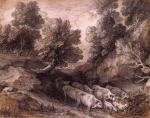
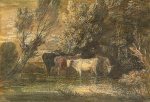
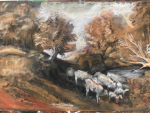
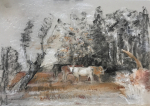
(If anyone likes them, I would happily consider swapping for a pledge on Salt Lick! Funding begins on Thursday. Let me know.)
January 9, 2020
Short Story Giveaway
[image error]I have two short stories that I am giving away to anyone who signs up for my newsletter. The first is called Love Birds, and is about a gentleman who collects shoes. The second, Different Corner, is about finding refuge and new worlds in the library.
The newsletter is fairly sporadic, and comes with great recommendations for a range of books. Sign up here, and please if you can, share. Many thanks, Lulu.
If you read the stories, I’d love to know what you think – get in touch or leave a comment below.
December 16, 2019
All For Nothing by Walter Kempowski
[image error]
As I read this, now and then I thought of the strange insular world of Gormenghast, as though it had been dialled down into faded, if odd, normality. This isn’t a very accurate description of the book, but the eccentricity of an insular, aristocratic existence, built on strange ritual and isolation is in both. All for Nothing shows us how endlessly, drearily, certainly we have a place in the world and how quickly the world can displace us. I’ve not read anything before from the perspective of ordinary Germans about to lose the war, some in dismay that their certainties are broken, some as baffled by what will follow as they were by what has just been.
Russian guns rumble in the east as the disparate family try to decide whether to flee, where to go. A small boy caught in the amber of his isolating privilege is thrown onto the roads of a world remade in dramatic and dangerous ways.
A lovely, human, tender book.
All For Nothing by Walter Kempowski
https://www.goodreads.com/review/list/9473841-lulu”>View all my reviews

